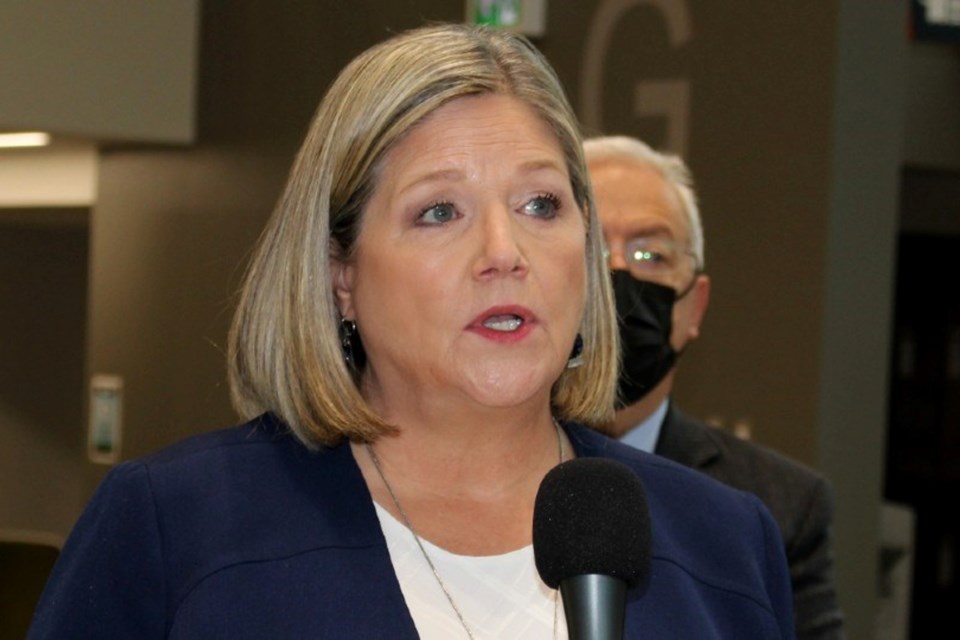With the COVID-19 pandemic exacerbating existing shortcomings in mental health-care coverage, the Ontario NDP has pledged universal mental health care under OHIP.
This, Ontario NDP Leader Andrea Horwath said during a campaign rally in Toronto this afternoon, will help fill a gap in service in which one-quarter of Ontarians have sought mental health or addictions help during the pandemic.
“Many who needed help didn’t get it,” Horwath said during the rally, pointing to statistics around young people on wait lists as particularly troubling.
There are more than 28,000 young people waiting on mental health services in Ontario, which Horwath said is more than double the 12,000 that were on wait lists in 2017. They now face a wait of up to two-and-a-half years for care, which has resulted in a spike in emergency room visits.
“Our young Ontarians deserve so much better than this, don’t they?” she asked.
The wait list in Greater Sudbury hovers at around the 18-month mark, Nickel Belt NDP MPP France Gélinas told Sudbury.com following Horwath’s announcement.
“If we start with children, there are a lot – you can go into any school, any place where people look after children … who have serious mental illness that have shot through the roof,” she said.
“Right now, when you know that your child is not well, you don’t know how to treat it, it often brings a lot of tension in the family.”
Immediate access to mental health services can help alleviate some of this stress, Gélinas added, which her party’s platform announcement has promised.
With approximately 500,000 Ontarians with mental-health needs and no access to counselling or therapist services because they don’t have insurance, Horwath said this is where the province will start in their mental health plan rollout, if elected.
“We’ll work with existing community-based providers to bring them into the publicly funded system,” she said, adding that with increased funding they will also work to boost the number of mental-health practitioners working in the province.
Whether it’s through a hospital or a social worker at a community health centre, she said mental health services such as therapy and counselling will be covered for all Ontarians through OHIP.
“If we are going to help folks bounce back from this pandemic and live their best lives, if we’re going to keep our little ones and young folks safe and healthy … then we have to give every Ontarian the mental health supports that they need,” Horwath said.
“No one should have to struggle with their mental health alone because they can’t afford or find help.”
Locally, Gélinas said there’s a scattering of free mental health services available in the Greater Sudbury area, including the Canadian Mental Health Association services on Elm Street, but that they cover “a very small portion of the population.”
Most people are pointed toward services that carry a cost, which not everyone has health insurance to cover, even partially.
Closely related to these mental health concerns is the opioid epidemic, which is affecting communities across the country but has disproportionately impacted Greater Sudbury.
In October, the Ontario Medical Association’s leadership visited the Crosses for Change on Paris Street in downtown Sudbury, where 214 memorials were set up to recognize those who have died by overdose.
Speaking with local media on site, Ontario Medical Association president Adam Kassam noted that Greater Sudbury alone is short 40 psychiatrists, 100 family doctors and 130 specialists.
During a conference call with media today, Horwath clarified that her party’s addictions-specific strategy would be coming soon, but that part of it includes 30,000 new supportive residential units for people living with mental health and addictions.
Gélinas confirmed this strategy should be released within the next couple of weeks and that it will be an important part of their platform.
“My heart sinks as I see more and more crosses to the number of people who have died in this epidemic,” she said of the Crosses for Change, adding that care, resources and energy directed to protecting people from addictions work together to save lives and that other provinces are doing better than Ontario.
“If you’re mentally not healthy, you can’t be healthy, and it comes at a huge cost to yourself, your family, our society.”
Tyler Clarke covers city hall and political affairs for Sudbury.com.
